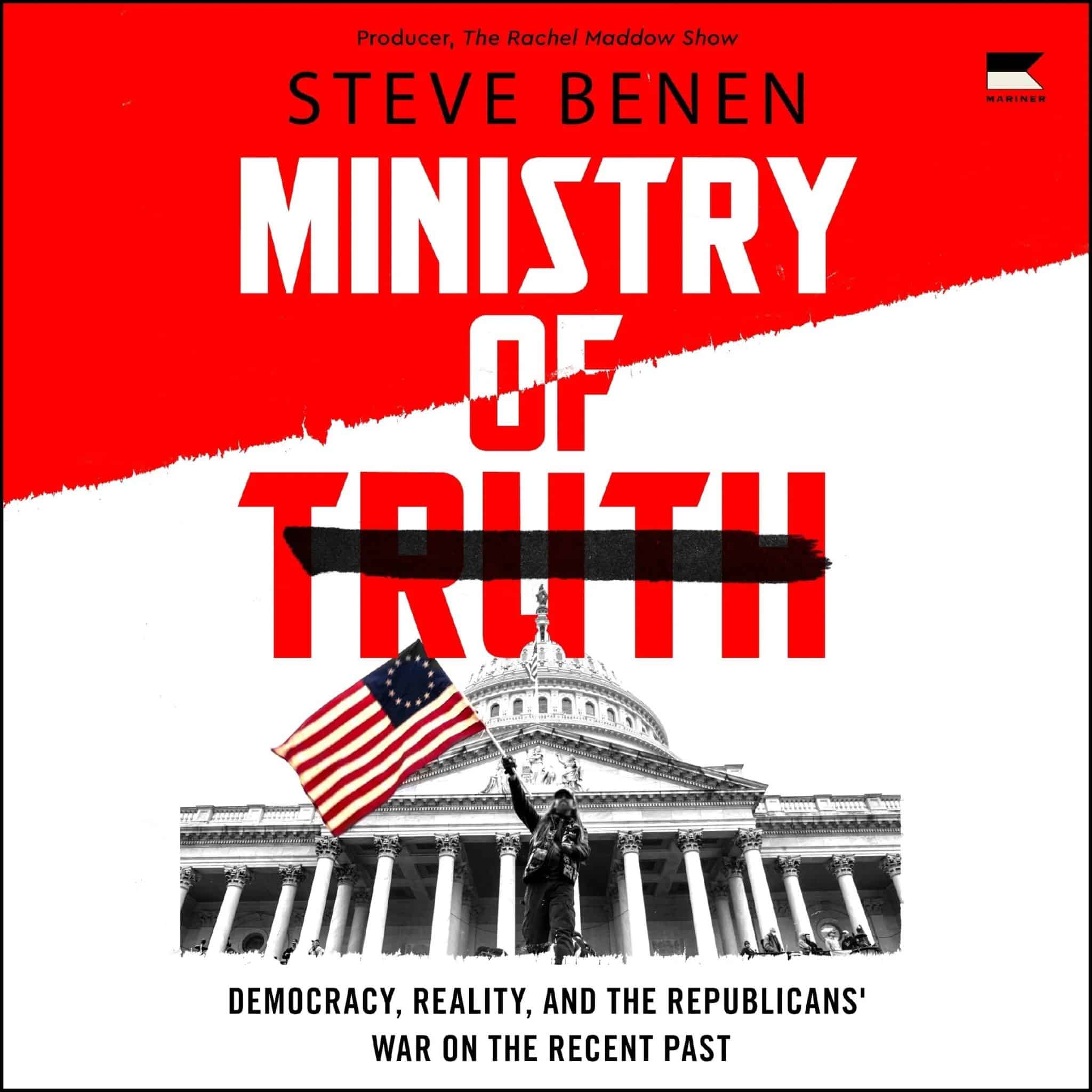In 1995, Umberto Eco published his famous essay on the nature of fascism. He described it as a “beehive of contradictions,” a movement proclaiming its obedience to God, but fundamentally pagan and merciless to its enemies, enamored of modern technology, but vested in racial superiority and the “will to power” that determined the “immortal destiny” of peoples. Fascism embarked upon a permanent state of war for social unity by “exploiting the natural fear of difference” in others. Eco conceded that we would likely never again see the Italian or German fascism of his youth during World War II, but asked: “Is there still another ghost stalking Europe (not to speak of other parts of the world)?
There is. And it is here.
Steve Benen’s Ministry of Truth: Democracy, Reality, and the Republicans’ War on the Recent Past bridges the worst elements of Europe’s old fascism and too much of contemporary Republican Party in America. Then, as now, the truth is the first victim of a deliberate attack on history.
The recent past is packed full of extensively documented bad acts committed by the Republican Party and its leadership, from their 2016 cooperation with Russian operatives – a topic extensively investigated by the Republican majority Senate Select Committee on Intelligence, to the “perfect” 2019 phone call between Donald Trump and Ukrainian president Volodymyr Zelensky, corroborated by a dozen witnesses (100), to deliberate deception regarding COVID, by Trump’s own admission (134), to live video feeds of the January 6th insurrection.
According to Benen, over the better part of the past decade, Republicans have deliberately avoided inconvenient truths. Their methodology varies. Republican campaigns share a deliberateness and careful coordination between public figures and a broad spectrum of media outlets, taking advantage of the increasingly blurry line between information and entertainment. Some of these techniques are directly borrowed from Trump’s reality TV career on The Apprentice when he often mistakenly fired the wrong contestant and forced show runners into “retroactive narrative construction,” essentially re-editing show content to compensate for his errors. (176) In this world, real life could be bent to suit the star’s own personal preferences rather than the truth. Today’s Republican Party, living as it is under Trump’s thrall, embraced the same process once the reality television host became president.
At points, their methods can be subtle. When Attorney General William Barr’s pre-emptively released his synopsis of the Mueller Report, U.S. District Court judge Reggie Walton, a 2001 George W. Bush appointee, called Barr to task for his “distorted” and “misleading” statements. (31)
More often than not, however, Republicans rely upon audacious gaslighting, “a brute-force rhetorical strategy” and “a shameless game of make-believe” as they rewrite history. (105) This was evident when the party ignored its responsibility for the January 6th insurrection and substituted a rotisserie of explanations –that it was committed by “the Antifa folks,” according to Sara Palin (71), that it was orchestrated by the FBI (82), that it was a “normal tourist visit” posing “zero threat” to police (74-77) — which clearly diverged from reality. When faced with the consequences of their lies, Trump and the Republican Party habitually attempt “to bully reality into submission, expecting voters wouldn’t know the difference.” (130)
Mangling the truth is not philosophical process, but one that is eminently practical. It is a proven fundraising device. (9-10) Jim Jordan, Elise Stefanik, Marjorie Taylor Greene, and Steve Scalise, among other Republicans have amassed formidable campaign war chests by abusing historical facts. Similarly, the party understands very well how its ongoing war on veracity is also a highly effective tool that moves polls on virtually any topic of public interest. Republican leaders ask their rank and file to ignore official authority and expertise and “put their faith in easily discredited nonsense from a failed and corrupt former president, his conspiratorial allies, and conservative media outlets that profited from his propaganda.” (64)
Simply put, attacking the truth works. Ministry of Truth illustrates a consistent pattern of success when Republicans rewrite history to reflect “their preferred narrative.” (149) A 2022 Monmouth University poll found that 77% of Republicans believed that January 6th was not an “insurrection” and 51% did not consider it a “riot.” (88) As late as 2023 69% of Republicans did not consider Biden the legitimate president because he had not won the election, according to a CNN survey. (63) In October 2023, Quinnipiac University released a poll noting 91% of Republican supported a border wall regardless of its actual effectiveness in stemming migration into the United States. (132) Although, according the Kaiser Family Foundation, the United States has so far suffered 1.2 million COVID deaths, Trump’s political base approved his COVID policies. (153) Despite hard evidence to the contrary, Trump scored higher on the economy than Biden in both 2020 (170) and 2023. (173)
Beyond the apparent utility of lying, Ministry of Truth is an important examination of what the “recent past” means to average American. According to Gallup, about a third of the public regularly follows the news, a rate that rose to 42% during the start of the COVID pandemic, but soon dropped only a few years afterwards. Even for people who do pay attention, a plethora of media platforms compete for and fracture their attention spans, as an article in The Atlantic by Megan Garber noted back in 2022.
Although Ministry of Truth came out only a few months ago, it is both fascinating and tragic to see how some of the issues it raised have aged, particularly since the November general election.
READ: Trump’s Firings of Military Leaders Pose a Crucial Question to Service Members of All Ranks
For example, public health policy has been crippled by political misinformation. As Benen notes, party status has a direct impact on immunizations. (155) According to a 2023 report by the Kaiser Family Foundation (KFF), the 24% of U.S. adults who are MAGA supporters are also among Americans least likely to get vaccinated or receive boosters. More to the point, according to a January 2025 KFF survey, Republicans are far more likely to trust Donald Trump (84%), Robert F. Kennedy (81%), and Dr. Mehmet Oz (83%) than the CDC (39%), Medicare and Medicaid (38%), and the Department of Health and Human Services (42%). This comes at a time when participation in basic vaccination programs is eroding and nineteen states have recorded new measles cases.
The Republican Party has also paid a price that it might not clearly understand. As the author notes early in Ministry of Truth:
“To leave the truth intact would have meant accepting the fact that the party and its president not only tried to overturn the results of a free and fair national election, they also rejected the foundational principles of American democracy.” (81)
When the party decided to unmoor its basic political platform from reality, it both opened up and encouraged forces that it cannot control. During the COVID pandemic, Trump tread a fine line between bragging about the rapid development of a vaccine under Operation Warp Speed and deliberately neglecting its distribution. (151) His constituents are not interested in such fine points. When Trump admitted to being vaccinated at campaign events in Alabama and Texas, he was roundly booed by his audiences. (154) Trump’s penchant for angry rhetoric has also produced some alarming consequences. According to a series of polls conducted between 2021 and 2024, Republicans are much more likely that Democrats or Independents to endorse violence as a means to further their political beliefs. This is the new norm for election workers, school board members, doctors, and any number of public officials.
In a larger sense, the ongoing damage to American democracy is significant and potentially catastrophic. Republicans and Democrats have been ringing alarm bells for years. William Cohen, a Republican from Maine who served as Secretary of Defense under Bill Clinton, commented in May 2021: “Those members who are trying to say, ‘No big deal’ on Jan 6,” they’re trying to perform a frontal lobotomy on the American people, a side effect which is mental dullness.” (78) During the 2024 sentencing of an individual who was part of the January 6th insurrection, U.S. district judge Royce Lamberth, a Reagan appointee, noted: “The court is accustomed to defendants who refuse to accept that they did anything wrong. But in my thirty-seven years on the bench, I cannot recall a time when such meritless justifications of criminal activity have gone mainstream.” (90)
This story took an important turn last year when the Supreme Court issued its decision in Trump v. the United States, a case that addressed the president’s alleged efforts to overturn the results of the 2020 election but also established new parameters for the abuse of executive authority. The court held that:
“Under our constitutional structure of separated powers, the nature of Presidential power entitles a former President to absolute immunity from criminal prosecution for actions within his conclusive and preclusive constitutional authority. And he is entitled to at least presumptive immunity from prosecution for all his official acts.”
As an American Civil Liberties Union press release noted in July 2024: “At bottom, though, the court’s 6-3 majority freed presidents to use their official powers to engage in criminal acts substantially free of accountability.”
In the end, Umberto Eco’s “beehive of contradictions” might be perfectly legal.
Meantime, the American public is already contesting this potentiality. Trump’s polling numbers are underwater on immigration, foreign policy, the military, the economy, treatment of federal workers, and trade with Canada, among a host of issues.
Yet, the debate on an unconstitutional presidential third term illustrates our current dilemma. It will be interesting, and possibly predictable, to see where public opinion takes us.







